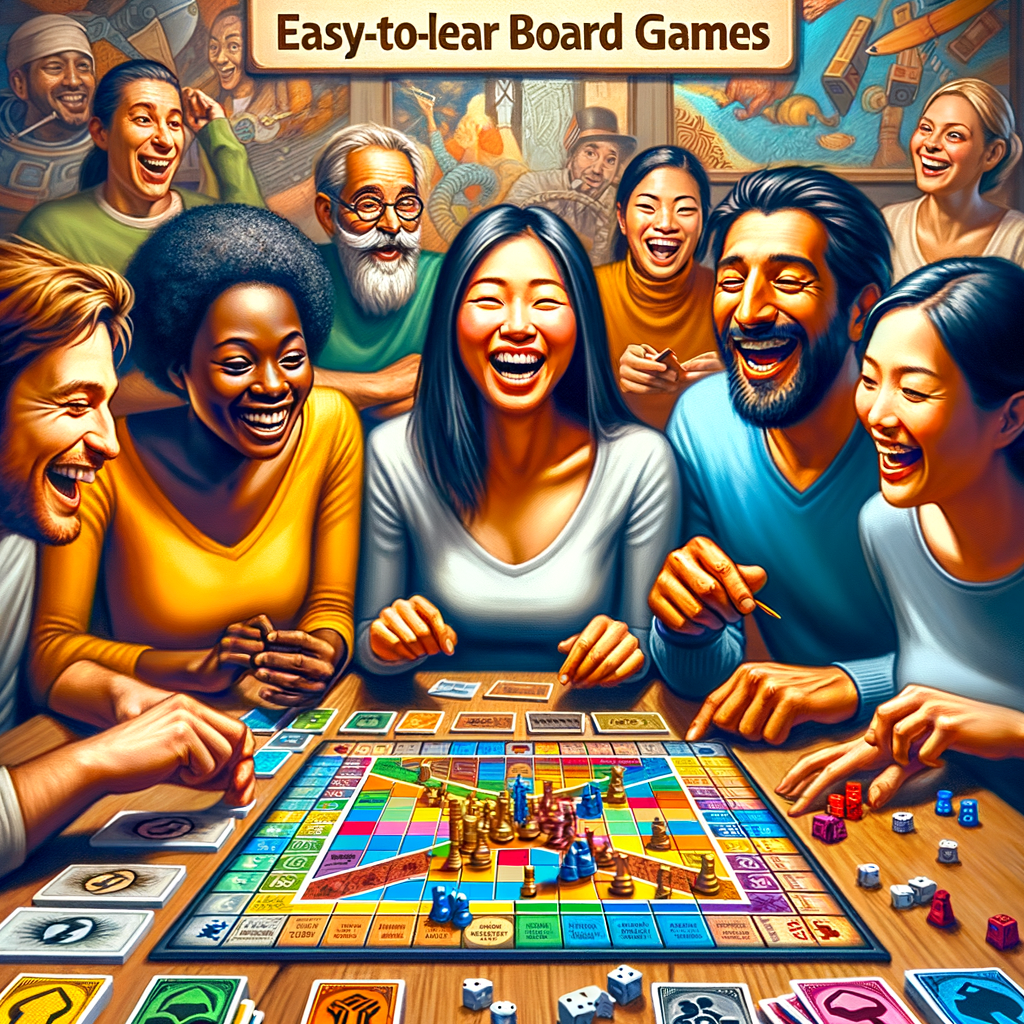Introduction to Board Games for Non-Gamers
Welcome to the exciting world of board games! If you’ve never played a board game before, or if you’re just looking to learn more, you’re in the right place. In this section, we’ll cover the basics of board games and why they make a great hobby for everyone.
- Understanding the basics of board games
Board games are a type of game that is played on a flat surface, usually a board, hence the name. They often involve moving pieces around the board and can be based on strategy, chance, or a combination of both. Some popular examples of board games include chess, Monopoly, and Scrabble. But these are just the tip of the iceberg. The world of board games is vast and diverse, with games to suit every taste and interest.
- Why board games are a great hobby for everyone
Board games are not just for kids or gamers. They are a fantastic hobby for everyone because they offer a wide range of benefits. Firstly, they are a great way to socialize and spend quality time with family and friends. They can also help improve skills such as strategic thinking, problem-solving, and communication. Plus, they’re just plain fun! Whether you’re looking for a way to relax after a long day or a fun activity for a social gathering, board games are a great choice.
So, whether you’re a non-gamer looking to dip your toes into the world of board games, or a seasoned player looking to broaden your horizons, we hope this introduction has sparked your interest. Read on to discover more about how to get started with board games, the best games for beginners, and tips and tricks to enhance your gaming experience.
Board Games for Beginners: How to Start
 Getting started with board games can seem daunting, but it doesn’t have to be. Here are three steps to help you dive into the world of board games.
Getting started with board games can seem daunting, but it doesn’t have to be. Here are three steps to help you dive into the world of board games.
Choosing Your First Board Game
Choosing your first board game is an important step. Consider what type of game you might enjoy. Do you like strategy games, or do you prefer games that rely on luck? Also, think about the number of players. Some games are best for two players, while others can accommodate larger groups. You might start with a classic game like Monopoly or Scrabble, or try a newer game like Catan or Ticket to Ride.
Learning the Rules and Gameplay
Once you’ve chosen a game, it’s time to learn the rules. Most games come with a rulebook that explains how to play. You can also find tutorials and explanations online. Don’t worry if you don’t understand everything right away. It’s normal to make mistakes and learn as you go. Remember, the goal is to have fun!
Getting Comfortable with the Gaming Environment
Finally, it’s important to get comfortable with the gaming environment. This includes understanding how to set up the game, how to keep score, and how to interact with other players. It’s also a good idea to find a comfortable place to play where you won’t be interrupted. And remember, it’s okay to ask questions if you’re not sure about something.
In conclusion, starting with board games can be a fun and rewarding experience. By choosing a game that interests you, learning the rules, and getting comfortable with the gaming environment, you’ll be well on your way to becoming a board game enthusiast.
Best Board Games for Non-Gamers
If you’re new to the world of board games, don’t worry! There are plenty of games that are easy to pick up and play, even if you’re not a seasoned gamer. Here are some of the best board games for non-gamers to start with.
Easy Board Games to Start With
These games are known for their simple rules and engaging gameplay. They are perfect for beginners and can serve as a great introduction to the world of board games.
- Monopoly: Monopoly is a classic board game that’s been loved by families for generations. The goal is to buy and trade properties, build houses and hotels, and try to bankrupt your opponents. It’s a game of strategy and luck, and it’s a great way to introduce non-gamers to the concept of board games.
- Scrabble: Scrabble is a word game where players use lettered tiles to create words on a game board. It’s a great way to challenge your vocabulary and spelling skills, and it’s easy to learn and play.
- Clue: Clue is a murder mystery game where players must figure out who the murderer is, what weapon they used, and where the crime took place. It’s a game of deduction and reasoning, and it’s a lot of fun for players of all ages.
These games are not only easy to learn, but they also provide hours of entertainment. So, whether you’re looking for a way to spend a rainy afternoon or a fun activity for your next family game night, these board games are a great place to start.
Board Games for Casual Players
If you’re a casual player who enjoys relaxing, fun-filled game nights, we’ve got some recommendations for you. These games are easy to learn, yet offer enough strategic depth to keep you engaged.
- Settlers of Catan
Settlers of Catan is a multiplayer strategy board game where players assume the roles of settlers, each attempting to build and develop their settlements while trading and acquiring resources. It’s a game of strategy, negotiation, and luck. The game’s simplicity, combined with its depth, makes it a great choice for casual players. Learn more about Settlers of Catan here.
- Ticket to Ride
Ticket to Ride is a railway-themed board game where players collect cards of various types of train cars and use them to claim railway routes on a map. The longer the routes, the more points they earn. This game is easy to understand, yet offers a strategic challenge that keeps players coming back for more. Find more about Ticket to Ride here.
- Uno
Uno is a classic card game that’s easy to learn and incredibly fun to play. The goal is to be the first player to get rid of all your cards, but watch out for special action cards that can change the game in an instant. It’s a game of luck and strategy, perfect for casual players. Discover more about Uno here.
These games are perfect for casual players who want to enjoy a fun, relaxed game night. So, gather your friends, pick a game, and let the fun begin!
Starting Board Games Hobby: Tips and Tricks
Embarking on a board games hobby can be an exciting journey. There’s a whole world of fun and strategy waiting for you. Here are some tips and tricks to help you get started.
Joining a local board game group
One of the best ways to dive into the world of board games is by joining a local group. These groups often meet regularly to play different games and are typically welcoming to newcomers. It’s a great way to learn new games, meet like-minded people, and have fun. You can find these groups on social media platforms like Facebook or through local community centers. Board game clubs are a great place to start.
Exploring different genres of board games
Board games come in all shapes and sizes, and exploring different genres can help you find what you enjoy most. There are strategy games, party games, cooperative games, and many more. Each genre offers a unique experience. For example, strategy games like Catan require careful planning and decision-making, while party games like Codenames are more about fun and interaction. Don’t be afraid to try something new!
Investing in a good board game collection
Once you’ve found the types of games you enjoy, it’s worth investing in a good board game collection. Start with a few classics like Monopoly or Scrabble, and then expand your collection based on your interests. Remember, the best games are the ones you enjoy playing, so don’t feel pressured to buy the latest or most popular games. It’s your collection, so make it reflect your tastes and interests.
Starting a board games hobby can be a rewarding experience. With these tips and tricks, you’ll be well on your way to becoming a board game enthusiast. Happy gaming!
Beginner’s Guide to Board Games: Key Takeaways
As we wrap up our beginner’s guide to board games, let’s revisit some of the most important points we’ve discussed. These key takeaways will provide a solid foundation for anyone looking to dive into the world of board games.
Board games are for everyone: One of the most wonderful aspects of board games is their universal appeal. Regardless of your age, background, or interests, there’s a board game out there that’s perfect for you. Board games are a great way to bring people together, encouraging social interaction, strategic thinking, and fun. Wikipedia has a comprehensive list of board games that cater to a wide range of preferences.
Starting a board game hobby can be easy and fun: You don’t need to be a seasoned gamer to enjoy board games. Starting a board game hobby is as simple as picking a game that interests you and finding people to play with. You can start with family and friends, and as you get more comfortable, consider joining a local board game club or participating in online gaming communities.
There are many board games suitable for non-gamers: If you’re new to board games, don’t worry. There are plenty of games designed with beginners in mind. Games like Ticket to Ride, Carcassonne, and Catan are easy to learn and incredibly fun to play. They offer a great introduction to the world of board games, and before you know it, you’ll be exploring more complex games with confidence.
Remember, the most important thing about board games is to have fun. Whether you’re a competitive strategist or a casual player, there’s a game out there for you. So why wait? Dive into the exciting world of board games today!
Non-Gamers Board Games: Case Studies
Let’s delve into some real-life examples that illustrate the positive impact of board games on non-gamers. These case studies will provide you with a deeper understanding of how board games can be a fun and beneficial activity for everyone.
- Case Study 1: The Success of Family Game Nights
Family game nights have been a tradition for many households. A survey conducted by Hasbro revealed that 91% of those polled said playing board games helped increase their family’s bond. The study also found that families who regularly engaged in game nights reported lower stress levels and improved communication among family members. This case study shows that board games can be a great way to bring non-gamers into the fold, providing a fun activity that also strengthens family relationships.
- Case Study 2: Board Games in Social Gatherings
Board games have also found their place in social gatherings. A group of friends in New York started a weekly board game night, inviting both gamers and non-gamers. Over time, they noticed that the non-gamers became more engaged and looked forward to the weekly gatherings. The group reported improved social connections and a sense of community, demonstrating the power of board games to bring people together and foster friendships.
- Case Study 3: The Therapeutic Benefits of Board Games
Board games are not just for fun; they can also have therapeutic benefits. A study conducted by the American Psychological Association found that board games can help improve cognitive functions in older adults. Non-gamers who participated in the study reported improved memory and cognitive skills after regularly playing board games. This case study highlights the potential of board games as a therapeutic tool, providing both entertainment and cognitive benefits.
In conclusion, these case studies demonstrate that board games can be a fun and beneficial activity for non-gamers. Whether it’s strengthening family bonds, fostering social connections, or improving cognitive functions, board games have a lot to offer. So why not give it a try? You might just find a new hobby that you love.
Conclusion: Embrace the Fun of Board Games
As we wrap up our discussion on board games for non-gamers, it’s time to reflect on the journey we’ve taken together. We’ve explored the world of board games, delved into the basics for beginners, and even highlighted some of the best games for non-gamers. Now, let’s recap the benefits and encourage you to dive into this exciting hobby.
- Recap of the benefits of board games for non-gamers
Board games are not just about fun and entertainment. They offer a plethora of benefits that can enrich your life in many ways. They stimulate your brain, promoting cognitive skills like problem-solving and strategic thinking. They foster social interaction, helping you to connect with family and friends in a meaningful way. Plus, they provide a break from the digital world, offering a chance to unwind and relax. Wikipedia also notes that board games can promote teamwork and cooperation, enhancing your interpersonal skills.
- Final thoughts and encouragement for non-gamers to try board games
If you’ve never tried board games before, it’s never too late to start. Remember, everyone was a beginner at some point. Don’t be intimidated by the variety of games or the strategies involved. Start with simple games and gradually move on to more complex ones as you gain confidence. The joy of board games lies in the journey, not just the destination. So, embrace the fun, enjoy the camaraderie, and let the games begin!
In conclusion, board games are a treasure trove of fun, learning, and connection. They offer a unique blend of entertainment and enrichment that’s hard to find in other hobbies. So, why not give it a try? Who knows, you might just find your new favorite pastime!



